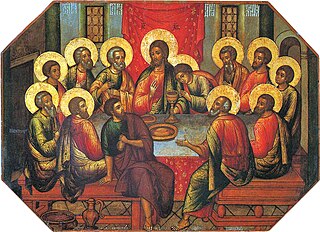
Maundy Thursday is the Christian holy day falling on the Thursday before Easter. It commemorates the Washing of the Feet (Maundy) and Last Supper of Jesus Christ with the Apostles, as described in the canonical gospels.
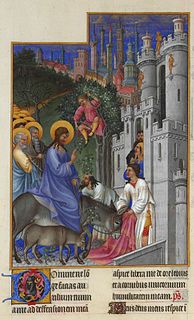
In Christianity, Holy Week is the week immediately preceding Easter. It is also the last week of Lent, in the West, – Palm Sunday, Holy Monday, Holy Tuesday, Holy Wednesday, Maundy Thursday, Good Friday, and Holy Saturday – are all included. However, Easter Day, which begins the season of Eastertide, is not.

The Paschal Triduum, Holy Triduum, or Easter Triduum, or the Three Days, is the period of three days that begins with the liturgy on the evening of Maundy Thursday, reaches its high point in the Easter Vigil, and closes with evening prayer on Easter Sunday. It recalls the Passion, Crucifixion, Death, burial, and Resurrection of Jesus, as portrayed in the canonical Gospels.
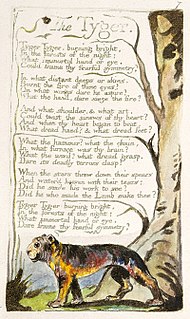
"The Tyger" is a poem by the English poet William Blake published in 1794 as part of the Songs of Experience collection. Literary critic Alfred Kazin calls it "the most famous of his poems", and The Cambridge Companion to William Blake says it is "the most anthologized poem in English". It is one of Blake's most reinterpreted and arranged works.
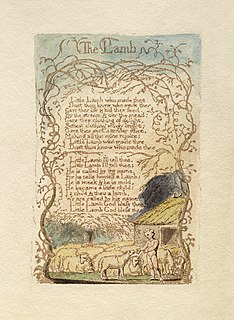
"The Lamb" is a poem by William Blake, published in Songs of Innocence in 1789.
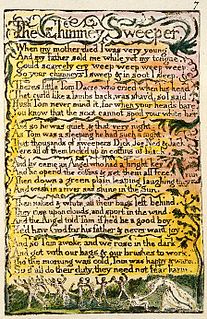
"The Chimney Sweeper" is the title of a poem by William Blake, published in two parts in Songs of Innocence in 1789 and Songs of experience in 1794. The poem "The Chimney Sweeper" is set against the dark background of child labour that was prominent in England in the late 18th and 19th century. At the age of four and five, boys were sold to clean chimneys, due to their small size. These children were oppressed and had a diminutive existence that was socially accepted at the time. Children in this field of work were often unfed and poorly clothed. In most cases, these children died from either falling through the chimneys or from lung damage and other horrible diseases from breathing in the soot. In the earlier poem, a young chimney sweeper recounts a dream by one of his fellows, in which an angel rescues the boys from coffins and takes them to a sunny meadow; in the later poem, an apparently adult speaker encounters a child chimney sweeper abandoned in the snow while his parents are at church or possibly even suffered death where church is referring to being with God.

Songs of Innocence and of Experience is a collection of illustrated poems by William Blake. It appeared in two phases: a few first copies were printed and illuminated by Blake himself in 1789; five years later he bound these poems with a set of new poems in a volume titled Songs of Innocence and of Experience Shewing the Two Contrary States of the Human Soul. Blake was also a painter before the creation of Songs of Innocence and Experience and had painted such subjects as Oberon, Titania, and Puck dancing with fairies.

"The Blossom" is a poem by William Blake, published in Songs of Innocence in 1789.

Holy Thursday is a poem by William Blake, from his 1789 book of poems Songs of Innocence.

"Holy Thursday" is a poem by William Blake, first published in Songs of Innocence and Experience in 1794. This poem, unlike its companion poem in "Songs of Innocence" (1789), focuses more on society as a whole than on the ceremony held in London.
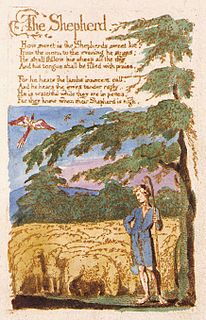
"The Shepherd" is a poem from William Blake's Songs of Innocence (1789). This collection of songs was published individually four times before it was combined with the Songs of Experience for 12 editions which created the joint collection Songs of Innocence and of Experience (1794). Blake produced all of the illuminated printings himself beginning in 1789. Each publication of the songs has the plates in a different order, and sixteen other plates were published posthumously.

"The Divine Image" is a poem by the English poet William Blake from his book Songs of Innocence (1789), not to be confused with "A Divine Image" from Songs of Experience (1794). It was later included in his joint collection Songs of Innocence and of Experience (1794). In this poem Blake pictures his view of an ideal world in which the four traditionally Christian virtues–Mercy, Pity, Peace and Love–are found in the human's heart and stand for God's support and comfort. Joy and gratitude are sentiments expressed through prayer for the caring and blessing of an infallible almighty God and are shared by all men on Earth encompassing a sense of equality and mutual respect. The title of the poem refers to the Book of Genesis Chapter 1 verse 26: 'And God said: Let us make man in our image'.(KJV)

Songs of Innocence and of Experience is an album by folk singer/guitarist Greg Brown, released in 1986. Brown sets the poetry of William Blake to music.
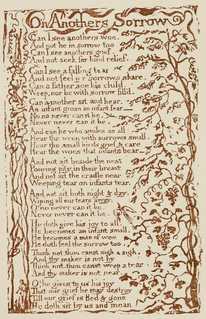
On Another's Sorrow is a poem by the English poet William Blake. The poem discusses human and divine empathy and compassion. It was published as part of the Songs of Innocence and of Experience in 1789 as the last song in the Songs of Innocence section.
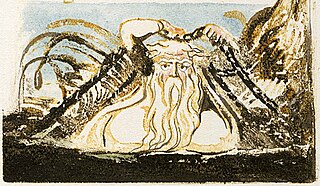
"The Human Abstract" is a poem written by the English poet William Blake. It was published as part of his collection Songs of Experience in 1794. The poem was originally drafted in Blake's notebook and was later revised for as part of publication in Songs of Experience. Critics of the poem have noted it as demonstrative of Blake's metaphysical poetry and its emphasis on the tension between the human and the divine.

Introduction to the Songs of Experience is a poem written by the English poet William Blake. It was etched and published as part of his collection Songs of Innocence and of Experience in 1794.

The Voice of the Ancient Bard is a poem written by the English poet William Blake. It was published as part of his collection Songs of Innocence in 1789, but later moved to Songs of Experience, the second part of the larger collection Songs of Innocence and of Experience, 1794.
"Night" is a poem in the illuminated 1789 collection Songs of Innocence by William Blake, later incorporated into the larger compilation Songs of Innocence and of Experience. "Night" speaks about the coming of evil when darkness arrives, as angels protect and keep the sheep from the impending dangers.
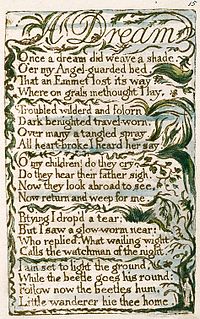
"A Dream" is a poem by English poet William Blake. The poem was first published in 1789 as part of Blake's collection of poems entitled Songs of Innocence.

Songs of Innocence and Experience is an album by American beat poet and writer Allen Ginsberg, recorded in 1969. For the recording, Ginsberg sang pieces from 18th-century English poet William Blake's illustrated poetry collection of the same name and set them to a folk-based instrumental idiom, featuring simple melodies and accompaniment performed with a host of jazz musicians. Among the album's contributors were trumpeter Don Cherry, arranger/pianist Bob Dorough, multi-instrumentalist Jon Sholle, drummer Elvin Jones, and Peter Orlovsky – Ginsberg's life-partner and fellow poet – who contributed vocals and helped produce the recording with British underground writer Barry Miles.


















